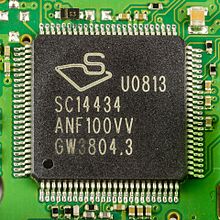Baseband processor
Baseband processors are part of a SoC in embedded systems such as smartphones, GPS or Bluetooth devices, where they take on all tasks that are directly related to data transmission via radio, i.e. signal generation and processing and the implementation of the higher levels of the respective protocol stack . For this purpose, the baseband processor contains a CPU , RAM and ROM as well as a digital signal processor . It can be installed on its own chip or as an IP core . A real-time operating system often runs on the CPU of the baseband processor .
Mobile phones
While the baseband processor is the only computing platform on older cell phones, it is imperceptible to smartphone users - there the user software is executed on the application processor with its own CPU and is based on a different operating system. With the iPhone 3G, for example, the user software runs on the iOS and this runs on an ARM 1176JZ, whereas the phone stack is based on the Nucleus RTOS and runs on an ARM926. Outwardly, the baseband processor represents a little-noticed additional attack surface.
There are several reasons for separating the CPU for user software and the baseband processor. Mobile communications regulations, for example, prescribe a certification procedure for the entire communication stack. By separating the two systems, there is no need to certify the user operating system, which changes much more frequently. In addition, the communication system naturally has to adhere to tight time limits, which can be achieved more easily by outsourcing to a second system.
Individual evidence
- ^ Martin Sauter: Mobile Kommunikationssysteme, 3rd edition, Vieweg-Verlag, page 72
- ^ Harald Welte: Anatomy of contemporary GSM cellphone hardware. ( Memento of October 31, 2013 in the Internet Archive ) Apr. 2010
- ↑ http://www.cpushack.com/2012/09/06/apple-iphone-update-whats-changed-since-the-iphone-4/
- ↑ http://www.extremetech.com/computing/170874-the-secret-second-operating-system-that-could-make-every-mobile-phone-insecure
- ↑ Ralf-Philipp Weinmann: Baseband Attacks: Remote Exploitation of Memory Corruptions in Cellular Protocol Stacks. In WOOT, pp. 12-21, 2012
